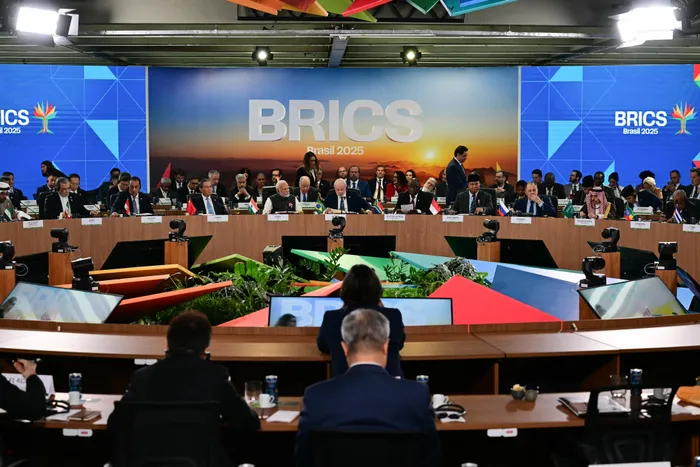
General view during a plenary session of the BRICS summit in Rio de Janeiro, Brazil. With nearly half the world’s population represented by BRICS nations, the influence our media outlets hold in shaping narratives, challenging bias, and offering alternative perspectives is vast.
Image: Pablo Porciuncula / AFP
AS leaders and media representatives from across the BRICS nations gathered in Rio de Janeiro for this year’s BRICS Media Forum, we found ourselves at a critical juncture in global media and geopolitics.
With the recent expansion of BRICS to include Indonesia and 10 new partner countries under the BRICS+ framework, the forum signalled a deepening of collaboration, not just among governments and economies, but also across our most vital communications platforms.
The forum’s guiding vision aligns with Brazil’s broader BRICS+ priorities for 2025: strengthening inclusion, enhancing South-South cooperation, and reforming global governance. In this context, the media plays an indispensable role in promoting dialogue, building trust, and safeguarding truth.
With nearly half the world’s population represented by BRICS nations, the influence our media outlets hold in shaping narratives, challenging bias, and offering alternative perspectives is vast. The Rio forum offered us the opportunity to reaffirm our shared values and recalibrate our responsibilities, especially in a world increasingly threatened by disinformation, propaganda, and polarisation.
Three central themes guide the forum:
Each of these topics presents a roadmap not only for BRICS cooperation but for how the global media landscape could evolve toward greater fairness, accuracy, and ethical responsibility.
A key pillar of any functioning democracy, and indeed of sustainable development, is press freedom. Across the world, the media have come under pressure, whether through government censorship, corporate interference, or subtle forms of financial manipulation. As BRICS media leaders, we must be vigilant and vocal in defending the freedom of the press, both within our borders and abroad.
Equally important is the fight against fake news and disinformation. One proposal worth serious consideration is the formation of a BRICS joint media task force dedicated to countering misinformation. Through shared technological tools, fact-checking systems, and journalist exchanges, we can collectively elevate the credibility and integrity of news disseminated within and beyond BRICS nations.
Diversity and inclusion also deserve a central place in the BRICS media agenda. Our alliance encompasses a wide array of cultures, languages, and lived experiences. This diversity must not only be reflected in our coverage; it must be celebrated as a strategic advantage. Through collaborative reporting, editorial partnerships, and cultural exchanges, we can resist the homogenisation of media that so often accompanies Western dominance in global news flow.
Technological innovation is another vital area. The digital age has brought unprecedented challenges and opportunities. As BRICS nations, we must invest in innovation and digital inclusion, especially in underserved regions, so that the full benefits of new media platforms are available to all. From combating digital surveillance to embracing AI responsibly, media innovation must be shaped by ethical and human-centred values.
Beyond media collaboration itself, the BRICS bloc also has a historic opportunity to challenge structural inequalities in global governance. One bold proposal is the establishment of a BRICS Ratings Agency, a counterbalance to Western-dominated financial rating institutions that often fail to account for the developmental realities of the Global South. A BRICS-led agency could offer more nuanced, fair, and contextually appropriate assessments, especially for public enterprises and state-led development projects.
Similarly, the idea of a common BRICS currency continues to gain traction. While implementation would be complex and gradual, such a currency could help member states reduce dependency on the US dollar, stabilise trade relations, and enhance economic sovereignty.
As we look to the future, institutional reforms must remain at the heart of the BRICS project. A permanent secretariat or coordinating body for BRICS media, for example, would help ensure continuity, shared standards, and deeper collaboration. It would also safeguard our momentum beyond rotating presidencies and changing political landscapes.
* Adri Senekal de Wet is the editor-in-chief of Independent Media.